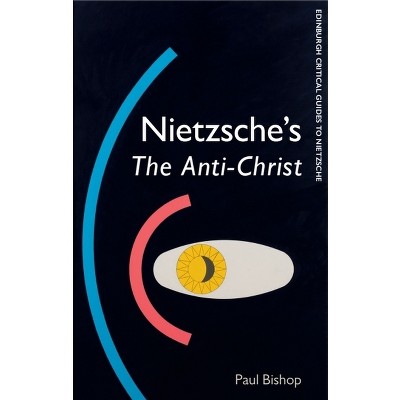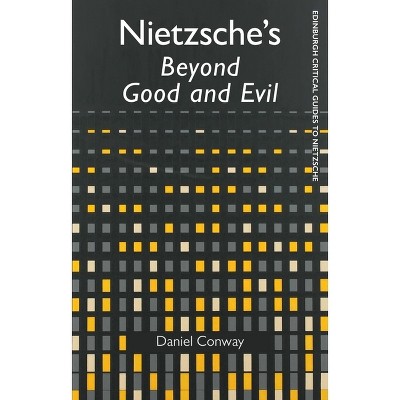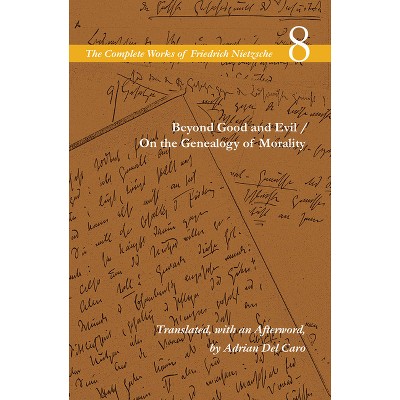Nietzsche's on the Genealogy of Morality - (Edinburgh Critical Guides to Nietzsche) by Robert Guay (Paperback)

About this item
Highlights
- On the Genealogy of Morality has become the most common point of entry into Nietzsche's thought.
- About the Author: Robert Guay is Associate Professor of Philosophy at Binghamton University.
- 240 Pages
- Philosophy, Individual Philosophers
- Series Name: Edinburgh Critical Guides to Nietzsche
Description
About the Book
A philosophically sophisticated introduction to Nietzsche's most widely read book, for readers coming On the Genealogy of Morality - and Nietzsche's thought in general - for the first time.
Book Synopsis
On the Genealogy of Morality has become the most common point of entry into Nietzsche's thought. It offers relatively straightforward, sustained explanatory narratives addressing many of the main ideas of Nietzsche's mature thought, such as will to power, nihilism, perspectivism, the value of truth and the critique of morality. At the same time, it is challenging to understand because Nietzsche intended it as an expansion and elaboration of his existing ideas. Robert Guay provides the interpretive and philosophical context to help new readers of Nietzsche understand both the book and Nietzsche's thought more widely. He shows how Nietzsche's narratives engage with philosophical issues about agency, self-knowledge, historical explanation and the critique of morality.
From the Back Cover
A philosophically sophisticated introduction to Nietzsche's most widely-read book On the Genealogy of Morality has become the most common point of entry into Nietzsche's thought. It offers relatively straightforward, sustained explanatory narratives addressing many of the main ideas of Nietzsche's mature thought, such as 'will to power, ' 'nihilism, ' 'perspectivism, ' and the 'value of truth'. It also directs its attention to what is widely taken to be Nietzsche's important philosophical contribution, the critique of morality. Yet it is challenging to understand because Nietzsche intended it as an expansion and elaboration of his ideas developed elsewhere. Presupposing no prior knowledge of Nietzsche or the text Robert Guay provides the interpretive and philosophical context to make Nietzsche's thought more accessible and shows how Nietzsche's narratives engage with philosophical issues about agency, self-knowledge, historical explanation and the critique of morality. Robert Guay is Associate Professor of Philosophy at Binghamton University.Review Quotes
Robert Guay's commentary On the Genealogy of Morality illuminates Nietzsche's startling suggestion that our conception of ourselves as moral agents is harmful to us. His reading shows how our sense of the peculiar authority of morality serves, despite its incoherence, to obstruct our efforts to forge meaningful alternatives for our lives.--Randall Havas, Willamette University, author of Nietzsche's Genealogy: Nihilism and the Will to Knowledge
Robert Guay's lucid, and innovative approach to Nietzsche's On the Genealogy of Morality disentangles with great subtlety and careful attention to the text the factors that led Nietzsche to think that a historical genealogy could show how morality came to matter to us as it did and why it cannot matter any longer. This focus on the possible meaningfulness of a moral code and its historical conditions reveals in a new way why Nietzsche thought his appeals to historical and psychological dimensions of the morality institution could be brought to bear on the question of the philosophical adequacy of that institution. This is an original and important contribution to our understanding of this book and Nietzsche himself.-- "Robert Pippin, The University of Chicago"
Written with clarity and intelligence, Guay's guide to Nietzsche's Genealogy offers a sensitive and original reading of the text as well as a careful engagement with the wider secondary literature on it. All students of Nietzsche will benefit from the lucidity of the analysis and argument that Guay offers. Highly recommended.-- "David Owen, University of Southampton"
About the Author
Robert Guay is Associate Professor of Philosophy at Binghamton University. He is the editor of Dostoyevsky's Crime and Punishment: Philosophical Perspectives (Oxford University Press, 2019). He is the author of a number of articles in the Journal of Nietzsche Studies and The European Journal of Philosophy.











